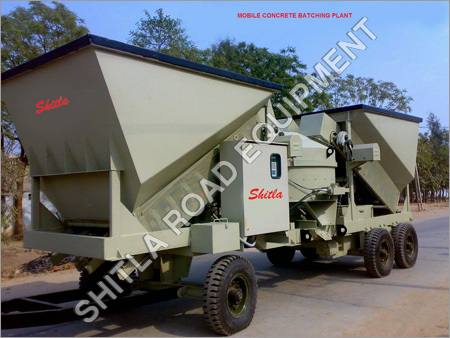
Mobile Concrete Batching Plant
1000000.00 - 1500000.00 INR/Unit
Product Details:
X
Mobile Concrete Batching Plant Price And Quantity
- 1000000.00 - 1500000.00 INR/Unit
- 1 Unit
Mobile Concrete Batching Plant Trade Information
- Ahmedabad
- 4 - 5 Unit Per Month
- 1 Months
- Australia North America Eastern Europe Middle East Central America South America Western Europe Asia Africa
- All India
- ISO
Product Description
Came into existence with a vision to attain a distinct niche in global and domestic markets, our firm is involved in fabricating Mobile Concrete Batching Plant. Owing to its mobility, it can be easily relocated from one construction site to another. Our professionals utilize sophisticated tools and technology to fabricating the offered the batching plant with qualitative metallic & non-metallic components. Capable to provide concrete in variegated capacities ranging from 12m3/hr to 20m3/hr, it is suitable for use during the construction of concrete roads. Our Mobile Concrete Batching Plant is acclaimed by clients for its low power consumption, easy installation, low maintenance and high operational accuracy.
Leveraging upon our vast industry experience, we are engaged in providing mobile concrete batching plant, which produces concrete in different capacities from 12m3/hr to 20m3/hr. This batching plant is manufactured in compliance with international standards using well-tested components and latest technology. Our offered range of mobile concrete batching plant is highly recognized for features like low power consumption, easy installation, high tensile strength, less maintenance and longer functional life. Clients can avail this concrete batching plant as per their needs at industry leading prices.
These plants are designed for all types of concrete mixes that include cement, cold regeneration and aggregates. We install the Mobile Concrete Batching Plant with an electronic load cell weighing device which records the weight of the mixed aggregates. Loading and unloading of aggregates and cement can be done manually or with the use of wheel rollers or conveyors in this plant. In addition to this, our plants are fully automatic electronic operated with integrated PLC/PC control and remote functions. The Mobile Concrete Batching Plant is easy to relocate as it is fitted with functioning wheels.
Mobile Concrete Batching Plant Specifications:
1. Productivity Capacity : 40 cubic meters per hour approx
2. Batching Plant Color : As per order
3. Mobile Batching Plant Discharging height : 3.8 m approx.
4. Discharge Height : 3.8 m approx
5. Mobile Batching Plant Condition : New
6. Batching Plant Weigh : 20 t
7. Mobile Batching Plant Power : 85 kw
8. Mixing Time : 60 s approx
9. Feeding height : N/A
10. Aggregate Bins : 2,3
Application Areas:
Construction sites and heavy engineering plants, bridges, dams, concrete roads, canals, other civil works
Working principle of Concrete Batching Plant:
A concrete batching plant, also known as a concrete mixing plant or concrete batch plant, is a facility that combines various ingredients to form concrete. These ingredients typically include water, cement, aggregates (such as sand, gravel, or crushed stone), and sometimes additives or admixtures. The primary function of a concrete batching plant is to produce uniform and high-quality concrete for construction projects. Here's an overview of the working principle of a concrete batching plant:
1. Aggregate Batching:
a. Aggregates (sand, gravel, or crushed stone) are stored in separate bins or silos within the batching plant.
b. Conveyor belts or bucket elevators transport the aggregates from the storage bins to a weighing hopper.
c. The aggregates are measured and weighed accurately in predetermined proportions, based on the concrete mix design.
2. Cement and Admixture Batching:
a. Cement is stored in silos, and admixtures are usually stored in separate tanks.
b. Similar to the aggregate batching process, conveyors or screw conveyors transport the cement and admixtures to weighing hoppers.
c. The cement and admixtures are also measured and weighed accurately according to the mix design.
3. Mixing:
a. Once the aggregates, cement, and admixtures are accurately measured, they are conveyed to a mixing unit.
b. In the mixing unit, these materials are combined and mixed thoroughly to create a homogeneous concrete mix.
c. The mixing process can be achieved through various methods, including tilting drum mixers, twin-shaft mixers, or planetary mixers.
4. Water Addition:
a. Water is a critical ingredient in the concrete mix, and its quantity is crucial for achieving the desired consistency and strength.
b. Water is added to the mix based on a predetermined water-cement ratio or a specific mix design.
c. Water is usually measured using flow meters or by controlling the time the water is added to the mix.
5. Control System:
a. Modern concrete batching plants are equipped with sophisticated computerized control systems.
b. These control systems ensure that the ingredients are measured accurately, and they allow for precise control of the mixing process.
c. Operators can input the desired mix proportions and monitor the entire batching process through a control panel.
6. Discharge and Transportation:
a. Once the concrete mix reaches the desired consistency and quality, it is discharged from the mixing unit.
b. The concrete is typically discharged into transit mixers (concrete trucks) for transportation to the construction site.
c. Alternatively, it can be discharged into concrete pumps for direct placement in various construction forms.
7. Cleaning and Maintenance:
a. Regular cleaning and maintenance of the batching plant's components, such as mixer blades, conveyor belts, and weighing systems, are essential to ensure consistent performance and prolong the plant's lifespan.
Benefits of Concrete Batching Plant:
Concrete batching plants offer several benefits for construction projects and concrete production processes. These benefits contribute to improved efficiency, quality control, and cost-effectiveness in the construction industry. Here are some of the key advantages of using concrete batching plants:
1. Consistent Quality: Concrete batching plants ensure consistent and uniform mixing of concrete ingredients, resulting in high-quality concrete with predictable properties. This consistency is crucial for meeting engineering specifications and ensuring the durability of structures.
2. Precise Proportions: Batching plants accurately measure and proportion ingredients, including aggregates, cement, water, and admixtures, based on the specific mix design. This precision helps achieve the desired concrete strength and characteristics.
3. Customization: Batching plants allow for the customization of concrete mixes to meet project requirements. Contractors can adjust mix proportions and add additives or admixtures to enhance properties such as workability, durability, or setting time.
4. Time Efficiency: Batching plants can produce large quantities of concrete quickly and efficiently. This reduces downtime and delays on construction sites, leading to faster project completion.
5. Cost Savings: Although setting up a concrete batching plant requires an initial investment, it can result in significant cost savings over the long term. Efficient use of materials, reduced labor, and lower transportation costs contribute to cost-effectiveness.
6. Environmental Benefits: Batching plants can incorporate recycling systems to reuse waste concrete and washout water, reducing environmental impact. Additionally, precise batching minimizes material waste, which is environmentally responsible.
7. Reduced Labor: Automation and computerized control systems in batching plants reduce the need for manual labor in the concrete production process. This can lead to cost savings and increased worker safety.
8. Consistent Performance: Batching plants can operate continuously, providing a steady supply of concrete as needed. This ensures a consistent flow of materials to construction sites, preventing delays and interruptions.
9. Quality Control: Batching plants are equipped with monitoring and control systems that track various parameters, such as mix proportions, temperature, and slump. This allows operators to make real-time adjustments to maintain consistent quality.
10. Increased Productivity: Batching plants can handle a wide range of production capacities, from small-scale projects to large infrastructure developments. This flexibility in production capacity enhances overall project productivity.
11. On-Site Concrete Production: Batching plants can be set up near construction sites, reducing the need for long-distance transportation of ready-mix concrete. On-site production minimizes transit time and transportation costs.
12. Enhanced Safety: The automation of concrete batching plants reduces the risk of accidents associated with manual handling of heavy materials and mixing equipment. This promotes a safer work environment.
13. Quality Documentation: Batching plants often generate detailed records of production, including batch reports and mix designs. These documents can be invaluable for quality assurance and project documentation.
FAQ:
Q. What is a concrete batching plant?
Ans: A concrete batching plant is a facility used in construction to mix various ingredients, including cement, water, aggregates (such as sand, gravel, or crushed stone), and sometimes admixtures or additives, to produce concrete in a controlled and consistent manner.
Q. Why are concrete batching plants used?
Ans: Concrete batching plants are used to ensure the production of consistent, high-quality concrete for construction projects. They allow precise measurement and mixing of ingredients, leading to uniform concrete with desired properties.
Q. What are the main components of a concrete batching plant?
Ans: The main components of a concrete batching plant typically include aggregate bins, cement silos, conveyor belts or bucket elevators, a mixing unit (which can be a mixer drum, twin-shaft mixer, or planetary mixer), water and admixture tanks, and a control system.
Q. How does a concrete batching plant work?
Ans: A concrete batching plant works by accurately measuring and proportioning the ingredients based on the desired mix design. These ingredients are then mixed together to create a homogeneous concrete mixture, which is later transported to the construction site.
Q. What is the difference between a stationary and a mobile concrete batching plant?
Ans: A stationary concrete batching plant is set up at a fixed location and is suitable for large or long-term construction projects. In contrast, a mobile concrete batching plant is portable and can be easily moved from one location to another. Mobile plants are more suitable for smaller or temporary projects.
Q. What is a dry mix concrete plant?
Ans: A dry mix concrete plant, also known as a transit mix or truck-mixed concrete plant, prepares and delivers concrete in a dry, unmixed form to the construction site. Water is added to the mix when it is being discharged from the transit mixer. This method is commonly used for ready-mix concrete.
Q. What are admixtures, and why are they used in concrete batching?
Ans: Admixtures are chemicals added to concrete mixes to enhance certain properties, such as workability, durability, setting time, or strength. They are used to customize the concrete to meet specific project requirements.
Q. How can I ensure the quality of concrete produced by a batching plant?
Ans: Quality control in concrete batching involves regular calibration of equipment, adherence to mix design specifications, proper storage of materials, and monitoring of batching processes. Regular testing and inspection of concrete samples can also ensure quality.
Q. Are concrete batching plants environmentally friendly?
Ans: Concrete batching plants can be made more environmentally friendly by implementing recycling systems for waste concrete and washout water, reducing material waste, and using energy-efficient equipment. Adherence to environmental regulations is essential.
Q. What is the life expectancy of a concrete batching plant?
Ans: The life expectancy of a concrete batching plant depends on factors such as maintenance, usage, and the quality of components used in its construction. With proper maintenance and care, a batching plant can have a lifespan of several decades.
Our export markets include Africa, Nepal, Bangladesh, Bhutan and UAE.
Get in touch with us



